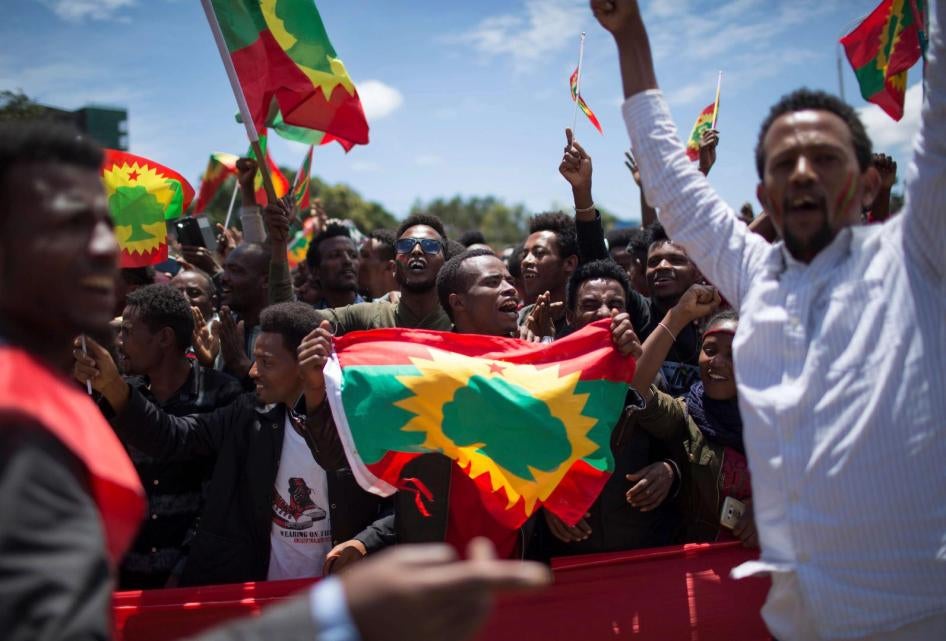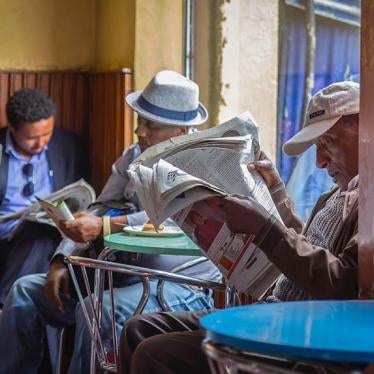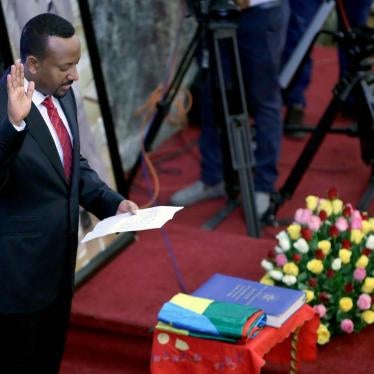One year ago this month, Dr. Abiy Ahmed was sworn in as prime minister of Ethiopia. His first few months in office saw many positive human rights reforms and a renewed sense of optimism following several years of protests and instability, along with decades of repressive authoritarian rule. Thousands of political prisoners have been released, a peace agreement has been signed with neighboring Eritrea, and Abiy has pledged to reform repressive laws. But in the months that followed, growing tensions and conflicts, largely along ethnic lines, have resulted in significant displacement and a breakdown in law and order across much of the country, threatening progress on key reforms.
This week we will publish a series of assessments of Prime Minister Abiy’s first year in office, looking at his government’s performance regarding eight key human rights priorities and providing recommendations on what more needs to be done in his second year in office, leading up to elections scheduled for May 2020.
Today, in Part 3 of 8, we look at the government’s performance on Freedom of Association, including limitations on civil society.
Freedom of Association
Significant progress has been made, particularly around the revision of the Charities and Societies Proclamation, which regulates the conduct of civil society. Questions remain however about how the law, including registration, will be implemented. The acceptance of previously banned groups back into Ethiopia is another significant development given how alleged connections with these groups has been used for many years as a tool to crack down on peaceful expressions of dissent. It remains to be seen how the government will handle the rehabilitation and reintegration of former fighters.
Background
In the past, the Ethiopian government has repressed freedom of association through laws such as the Charities and Societies Proclamation (CSO law) and the Anti-Terrorism Proclamation (ATP), both enacted in 2009 prior to the 2010 national elections.
The 2009 CSO law considered any civil society group that received more than 10 percent of its funding from abroad - even from Ethiopian citizens living outside of the country - to be "foreign." These groups were forbidden from doing any work that touches on human rights or governance. The law also created a new government entity, the CSO Agency, to oversee the registration and regulation of civil society organizations. The agency strictly limited the right to appeal when registration is denied and had broad discretion to order the closure and freeze assets of certain organizations. In the 10 years since the law was passed, civil society has been decimated as most NGOs were unable to survive without foreign funding and many groups were forced to drop human rights work to comply with the law in order to secure their registration.
The ATP punished political speech and peaceful protest as terrorist acts and encouraged unfair trials of those convicted. The law was a tool for suppressing political opposition and independent criticism of government policy. Under the ATP, the government designated some opposition groups as terrorist organizations - including the Oromo Liberation Front (OLF), the Ogaden National Liberation Front (ONLF), and Ginbot 7. Alleged affiliation of these groups was widely used as a justification for arrest. Many political leaders and dissidents fled the country over fears they would get caught up in the crackdown. The government used tools such as malware to target some of the leadership of these three groups living abroad, including some in the United States, the United Kingdom, Norway, Germany, and Eritrea. The government also routinely harassed refugees and asylum seekers located in neighboring countries, accusing them of belonging to these organizations and occasionally abducting them and unlawfully returning them to Ethiopia.
The EPRDF and its affiliates won all 547 seats in parliament in the 2015 national elections, up from 546 seats during the 2010 election– the inevitable outcome of a political system in which citizens had virtually no avenues for political engagement and opposition parties faced extraordinary challenges, including difficulties registering, harassment and arrest of members, and restrictions on freedom of movement.
Under Abiy
In February, the government approved the Organization of Civil Societies Proclamation and repealed the 2009 CSO law. The new law lifts the 10 percent foreign funding limit, the intrusive powers of the CSO agency, and the lack of appeal process over registration. There are some concerns with the law, including limitations on foreign lobbying, but overall the law is a marked improvement on the previous law. It is not yet clear when new civil society organizations will be able to register under this new law. While some domestic civil society organizations were given the opportunity to provide comment on draft versions of the law, there was little opportunity for public comment, a concern given that domestic civil society groups working in these areas had been decimated since the 2009 law. There was also little transparency around the contents of the final version of the law that was passed, even within some government circles.
The government is also in the process of drafting a revision to the ATP and presented a draft to legal experts, CSOs and opposition groups in February 2019 for input.
Thousands of political prisoners were released and/or pardoned when Abiy came to power, and peace agreements were struck with the OLF, ONLF and Ginbot 7, although the contents of these deals are not known. The peace agreements resulted in these organizations being removed from the terrorist organization list. Leaders of these organizations were openly welcomed back to Ethiopia, many of these organizations’ fighters returned, and these organizations now operate relatively openly. Flags and symbols of these groups can be displayed openly, without restrictions.
Ginbot 7 and OLF have reported challenges in holding rallies in some areas due to a lack of security and protection. Some alleged OLF operatives refused to disarm, saying that was never agreed to, and conflict between federal army and alleged OLF fighters caused casualties in some parts of Oromia, namely Wollega and Guji. In these areas, security forces conducted regular arrests of politically active individuals. Human Rights Watch is not aware of any of them being charged.
Human Rights Watch’s Ethiopia researcher was granted access to the country for the first time in eight years to join a workshop on rebuilding civil society.
What more can be done
The passage of a revised counterterrorism law that provides for the freedom of association of all individuals, regardless of political party or belief, is necessary. The registration process for new and existing CSOs should be set up immediately. If the CSO Agency needs time to transition to the new law, then consideration should be given to an automatic registration regime, so that CSOs, eager to start or restart after years of restrictions, can begin operations in advance of the May 2020 elections. Political parties should be able to hold rallies without obstruction or threat of violence. Political party registration should not be arbitrarily withheld or obstructed. In trying to restore law and order in Wollega and Guji, security forces should ensure they operate with respect for human rights, and refrain from any abuses against community members while pursuing insurgent fighters. They should also ensure that they carry out no arbitrary arrests of politically active youth where there is no evidence of involvement with illegal activity.









